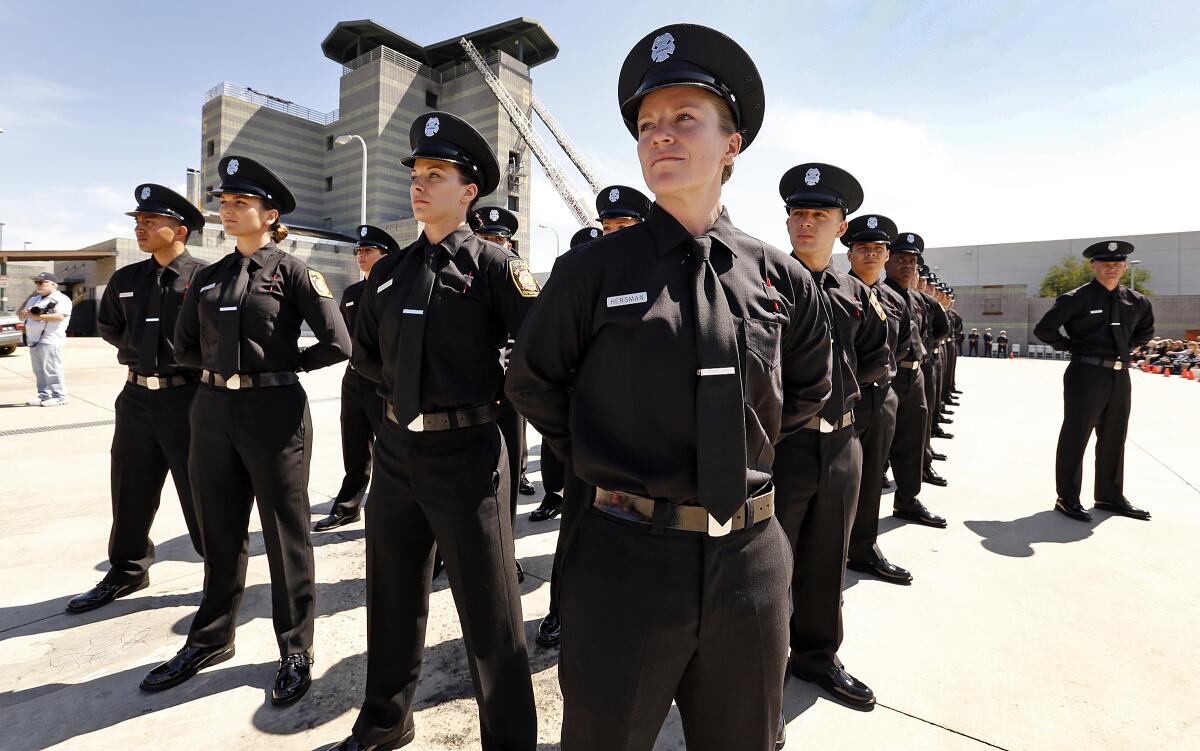What happened to reform? ‘Frat house’ culture still rules at Los Angeles Fire Department

- Share via
Mayor Eric Garcetti put gender equity front and center in his agenda when he took office in 2013, promising to provide equal opportunities across city government for the advancement of women. That included hiring more women at the Los Angeles Fire Department, a prestigious agency clouded by a costly legacy of race and sex discrimination.
Within his first year, Garcetti hired a new chief, appointed a new civilian Board of Fire Commissioners tasked with reform and began to overhaul the agency’s outdated recruitment process — all with the goal, he said, of bringing long-overdue change to the LAFD’s culture.
Eight years later, progress has been frustratingly slow. In fact, it may have been stalled altogether by the same political forces that stymied previous attempts to reform the Fire Department.
Granted, the department has diversified its ranks, and it’s hired and promoted more women during Garcetti’s tenure. Women now hold 115 jobs, accounting for 3.5% of the LAFD’s sworn personnel. That’s better than the 2.9% when Garcetti took office. Yet despite pouring millions of dollars into new recruitment efforts, the city still falls short of the mayor’s goal of having women make up 5% or more of sworn fire personnel, Times reporters James Rainey and Dakota Smith recounted.
It’s no wonder why. The LAFD still tolerates a “frat house” culture that can leave women and minority firefighters feeling bullied and mistreated. Why would women want to join a department where their capability will be constantly questioned and, according to one survey, they’ll endure widespread sexism in the workplace? It doesn’t help that the politically powerful firefighters union has resisted efforts to change the culture and make reforms.
It’s no simple job to dismantle long-standing bias against women in the fire service. It goes beyond L.A.; women make up more than 10% of the sworn personnel in few of this country’s fire departments.
Still, there’s understandable disappointment in Garcetti, who started off with the ambition to do great things on this front. He was elected on a promise to stand up to public employee unions and modernize city government. But it looks like, at some point, Garcetti decided it was more important — or advantageous to his political future — to appease the firefighters union than to demand reform.
Earlier this year Garcetti yanked Andrew Glazier, an outspoken advocate for reform, off the commission. The mayor’s office tried to persuade another commissioner who was an ardent supporter of female firefighters, Rebecca Ninburg, to leave the panel. Both commissioners have said they were told by the mayor’s staff that the firefighters union pushed for Glazier’s removal because he was making too many waves, which the mayor and union denied.
After nearly three decades of trying to reform the LAFD culture and make it a more inclusive department, it’s impossible to see how change will happen without making waves. The city has done the easier stuff, setting up recruitment fairs, mentorships, implicit bias training and even a camp for girls to learn about firefighting. But Garcetti and the LAFD have been slower on the harder stuff, such as addressing workplace culture or reconsidering entrenched institutional practices that make it more difficult to diversify the department.
Why, for example, were studies of workplace culture and training inequities delayed more than three years? Those studies were supposed to be major pieces of a strategic plan to reform the LAFD culture. And why must every sworn member be trained to respond to fires when more than 80% of calls are for emergency medical services? Even dispatchers and fire inspectors must complete the same physically rigorous fire training that some have described as nearly impossible for shorter recruits, who often are women. By prioritizing brute strength over other relevant skills, the department loses a lot of talented and qualified individuals.
Unlike the Police Department, which is regularly scrutinized by outside groups and pushed to reform, the Fire Department remains a largely insular institution. There just isn’t the external pressure to change the LAFD‘s practices until there is a scandal or lawsuit. Or possibly an election.
Los Angeles’ next mayor needs to commit to modernizing the Fire Department and bucking the internal resistance to change. The next fire chief should come from outside the LAFD’s hidebound culture in order to bring a fresh set of eyes to the department’s policies and practices. And the City Council needs to demand accountability from the department. Los Angeles leaders can’t tout their commitment to gender equity and turn a blind eye to demoralizing and discriminatory behavior in their own Fire Department.
More to Read
A cure for the common opinion
Get thought-provoking perspectives with our weekly newsletter.
You may occasionally receive promotional content from the Los Angeles Times.







